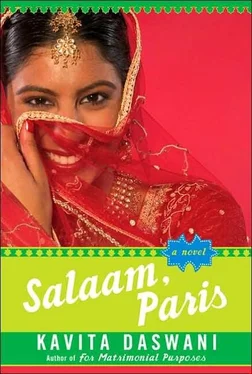“I never heard from you,” he said. “I wanted to make sure that you were OK, that nothing had happened to you. I didn’t have a phone number, only an address. Through my grandfather. You know how old-fashioned these people are.” He smiled and shrugged, his features broad and handsome. In each ear dangled a tiny gold loop, the only things about him reminiscent of a glorious Mughal heritage and accoutrements that looked strangely complementary to his dark suit and tie.
“I’m sorry I didn’t call. I’m fine,” I said, nervously fingering one end of my dupatta. I hadn’t thought through what I was going to tell my family when I returned home. My grandfather had finally called a few days before, but I was out, as usual, with Shazia. Aunt Mina had answered the phone, but told me later that she informed my grandfather that she had “no idea” about any alliance between Tariq and me.
“I don’t know where you have been going,” she had said to me later. “You deal with this yourself with your Nana. I do not wish to get involved.” Nana had told Aunt Mina to instruct me to call him back. I hadn’t done so yet.
“I’m not going to ask you why you didn’t contact me,” said Tariq. “We all have our own reasons for doing things. I thought it was weird myself, a girl flying all the way from India to view me. It’s unusual, you know. But I wanted to be open-minded. Living away from Pakistan has altered my outlook.”
For a second, I remembered Sabrina, the girl who had led me here. I closed my eyes for a moment and wanted to recall what I had been seeking, what had brought me here. I still wasn’t “of the world.” I was still standing on the sidelines and watching. Perhaps it took longer than two weeks. After almost a fortnight here, I was still the same girl. I remained silent, my eyes on the floor, knowing that I had no explanation.
“Well, I may as well get going,” he said. “As long as nothing happened to you.” He turned to face the door, then turned around again.
“Don’t worry about anything,” he said. “I will take care of it.”
When Shazia got off the phone, I told her about my unexpected visitor. She laughed gleefully and then raised her hand, expecting me to slap it, an odd mannerism that she had displayed numerous times.
“Well, at least that’s over with,” she laughed. “He got the message. You’re done with him.”
“You don’t understand,” I said to her quietly, keeping my voice down so Aunt Mina wouldn’t overhear. “They only sent me here on the express condition that I would agree to marry him. I didn’t even call him. What will I tell them when I go home?”
“What makes you think you’re going home?” she asked.
When the phone rang the next day, I knew instinctively that it was Nana. I decided to answer it myself.
“Tanaya? Beti! Where have you been?” he asked. I could imagine him frowning, his face red, and I could hear the chatter of voices in the background, other people crammed into booths next to his.
“Sorry, Nana, that I’ve not called. I’ve been meaning to, but with the time difference and all,” I said lamely. “Everything is OK. I am OK.”
“Everything is not OK!” he shouted. “I have just had a call from Tariq’s grandfather. I understand that the boy has rejected you. I am ashamed. What did you do wrong?”
My mind went blank for a second, before I realized that that was what Tariq meant when he said he would take care of things. It was far more acceptable for him to turn me down than for me to have never even called him in the first place.
“I did nothing, Nana. I met him. I was pleasant.”
“Did you do something to your face? He was told you were a beauty. Did you change something? Do you have a pimple?”
“No, Nana, nothing,” I said, embarrassed. “Maybe he just didn’t like me.”
“Hah!” he grunted. “So much expense to send you there, and for what? I told my friend that I will never speak to him again, that his grandson is ill-mannered and unworthy of our efforts. How dare he turn down a Shah girl!”
“Sorry to disappoint you, Nana. But it is all the will of Allah,” I said, trying to appease him.
He told me he had made arrangements to pick me up from the airport in Mumbai three days hence, and I quickly hung up.
The next morning, Paris was in its fullest glory. Shazia and I had decided to take a walk down the Champs-Elysées, and I marveled once again at its wide tree-lined streets and the sparkling stores that dotted our path. The sun was high in a pale blue sky, and a calm wind rustled my polyester-chiffon ensemble and caused a slight chill to cover my bare feet. I couldn’t imagine that in forty-eight hours, into which I was planning to cram a lot, I would be back at my home in Mahim, with nothing but the incessant rumbling of the trains from the railway station across the street to keep me company. The building we lived in was called Ram Mahal-literally “God’s Palace”-so named because when my grandfather had first bought our apartment there decades ago it was indeed a palace relative to the other buildings in the area. It had originally been painted a light yellow, but after forty years of monsoon rains and no upkeep, the exterior was now chipped and gray, with none of the pleasant prettiness of its heyday. Each of the five floors boasted a small courtyard, in which the children of the building would play catch and hide-and-seek, drinking tongue-pinching Limca from dirty glass bottles. There was no elevator, so the oldest and most infirm of the building’s residents remained at home for years on end, having everything brought to their door, finally having to be carried out on a stretcher. As a child, I used to love running up and down the stone steps, lit only by a single hanging bulb, feeling the smooth, thick curves of concrete banisters as I went from floor to floor visiting my friends. It had been the only building in the neighborhood to offer indoor plumbing. But now merely turning off the side street and into the entrance would yield the overpowering stench of human waste. In the last twenty years or so, squatters had set up camp right across the street, living beneath tents made from bamboo sticks, blue plastic sheets, and coarse burlap rice sacks. Small children, their hair crawling with lice, their clothes tattered but their tiny eyes still lined with kohl, would stand on the street and beg for a few rupees from the occupant of a passing car, or else they would forage for leftovers in the big mounds of trash that often lay uncollected in the street for weeks at a time.
“I really don’t want to go back there,” I said suddenly, shaking my head, turning to Shazia, as we continued our walk down the thoroughfare.
“Then don’t,” she replied, stopping. She put her hand on my arm. “Tanaya, you’ll think I’m crazy, but I honestly feel like you belong here. Like Paris isn’t done with you. I don’t think you should go home now.”
The wind felt cooler, and I wrapped my sweater tightly around me.
“But I have to go. There’s no way I can stay here. My ticket is ‘non-refundable-non-rerouteable-non-endorsable,’ ” I said, repeating my grandfather’s stern directive. “If I don’t use the return portion, it will go to waste.”
“That’s what return tickets from Paris are for. Wasting,” she said. “Look, come and sit a minute.” She led me to a nearby bench, and we eased ourselves down. I ran my finger over a rusty nail that held the painted green planks in place, confused about the conversation that Shazia and I were starting to have.
“I’ve been in your shoes,” she said. “I wanted to be somewhere else and it upset everyone. But I did it, because I had to. I know it’s hard. But see how long it took you to get out. What are you going back to Tanaya? Tell me.”
Читать дальше












